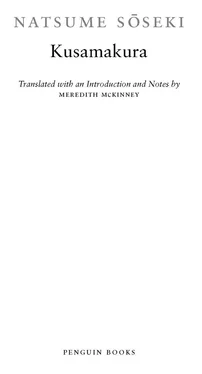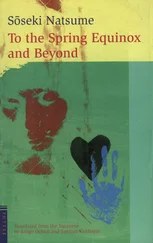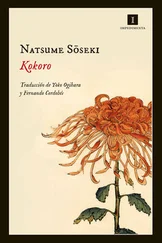Natsume Soseki - Kusamakura
Здесь есть возможность читать онлайн «Natsume Soseki - Kusamakura» весь текст электронной книги совершенно бесплатно (целиком полную версию без сокращений). В некоторых случаях можно слушать аудио, скачать через торрент в формате fb2 и присутствует краткое содержание. Жанр: Старинная литература, на английском языке. Описание произведения, (предисловие) а так же отзывы посетителей доступны на портале библиотеки ЛибКат.
- Название:Kusamakura
- Автор:
- Жанр:
- Год:неизвестен
- ISBN:нет данных
- Рейтинг книги:4 / 5. Голосов: 1
-
Избранное:Добавить в избранное
- Отзывы:
-
Ваша оценка:
- 80
- 1
- 2
- 3
- 4
- 5
Kusamakura: краткое содержание, описание и аннотация
Предлагаем к чтению аннотацию, описание, краткое содержание или предисловие (зависит от того, что написал сам автор книги «Kusamakura»). Если вы не нашли необходимую информацию о книге — напишите в комментариях, мы постараемся отыскать её.
Kusamakura — читать онлайн бесплатно полную книгу (весь текст) целиком
Ниже представлен текст книги, разбитый по страницам. Система сохранения места последней прочитанной страницы, позволяет с удобством читать онлайн бесплатно книгу «Kusamakura», без необходимости каждый раз заново искать на чём Вы остановились. Поставьте закладку, и сможете в любой момент перейти на страницу, на которой закончили чтение.
Интервал:
Закладка:
Once I arrive I recal how, years ago, I visited Kamakura and spent some time cal ing on the big Zen temples there. I think it was at a subtemple in the Engakuji temple complex that I was plodding, just as now, up the long stone staircase that led to the temple gate, when a priest in saffron robes with a flat, bald head appeared above me. I climbed, and the priest descended. As he passed me, he demanded sharply, “Where are you going?†My feet paused as I responded simply, “To see the grounds.†“There’s nothing to see,†he instantly shot back as he swept on. Somewhat disconcerted by his extreme curtness, I continued to stand there on the step, gazing at his receding figure, watching the flat head bob to and fro, to and fro, until he was lost among the cedar trees below. He never once turned to look back. Wel , wel , I thought, as I made my way through the temple gate, Zen monks are certainly intriguing. They have a fine brisk way about them. I looked around. There was no sign of life either in the main hal or in the spacious living quarters. Joy fil ed my heart at that moment. How deeply refreshing to know that someone so plainspoken existed, to be dealt with so wonderful y bluntly! My joy had nothing to do with any understanding of the truths of Zen Buddhist teaching; indeed, I had not the faintest idea of its meaning at that time. It sprang from the simple fact that this flat-headed priest delighted me.
The world is chock-ful of unpleasant people—the pestering and spiteful, the pushy types, the fussers and nigglers. Some make you feel they’re simply a waste of precious space on this earth. And it’s always this sort who real y throw their weight around. This fel ow wil consider the space he takes up to be a matter for tremendous pride. He feels his great purpose in life is to set a detective to work peering at your backside for years on end, counting your farts, and then he’l step out and stand there in front of you and make a song and dance about how many times you farted in the last five or ten years. If he says al this to your face, you can at least take note of what he’s saying, but you’l find him insinuating things behind your back. Complaining just makes him more insistent. If you tel him to drop it, he nags al the harder. “Okay, I understand!†you cry, but, no, he just goes on and on about the number of farts. And this he claims to be his highest ambition in life. Wel , everyone has their ambitions, and al I can say is, this fel ow would do far better to drop his harping on about farts and fix on some goal that wil shut him up.
It’s only common courtesy to put a hold on your ambition if it’s going to cause problems for others. And if you say that your goal can’t be fulfil ed without bothering others, then I wil say that mine requires me to fart—and there goes al hope for Japan.
To go strol ing like this through a beautiful spring evening without the slightest goal in mind is the essence of cultured refinement. My sole aim is to let pleasure and amusement arise where they wil —and if they don’t, so be it. If a poem occurs to me, that poem wil become my aim. If it doesn’t, then that can be the aim. What’s more, I am bothering no one; this must surely be the nature of a truly legitimate goal. That of fart counting is one of personal attack, while that of farting is justifiable self-defense. My present goal in climbing this flight of stairs to Kankaiji temple is to open myself, in the best Zen tradition, to the karmic moment.
When I reach the top, having gained the beginnings of a poem along the way, the faintly shimmering spring sea lies spread below me like an unrol ed sash. I enter the temple gate. I’ve lost interest in finishing off my poem, so my new aim promptly becomes to abandon it.
The stone path that leads to the abbot’s quarters is bordered on the right by an azalea hedge, and beyond this probably lies the graveyard.
To the left stands the main worship hal . The top of its tiled roof glimmers faintly, and gazing up, I have a sense that a mil ion moons have cast themselves over a mil ion roof tiles there. From nearby there comes a pigeon’s insistent cooing—it seems they live somewhere under the roof. I may be wrong, but the ground beneath the eaves appears to be scattered with smal white dots—pigeon droppings, perhaps.
Standing directly below the eaves’ drip-line is a row of weird, shadowy shapes. They’re certainly not smal plants of any sort; nor do they look like trees. They make me think of those little demons depicted praying to the Buddha in the painting of Iwasa Matabei,1 who have now left off their nembutsu prayer and are waving their arms in the dance that accompanies it.2 They dance ceremoniously, forming a line that stretches from one end of the worship hal to the other, while their shadows dance ceremoniously in a line beside them, in exact replica. The hazy moonlit spring night must have seduced them to abandon the accustomed bel and book with which the nembutsu worshippers traveled the land, gathering together on the moment’s impulse to come to this little mountain temple and dance.
When I approach, I realize they are in fact large cactuses, seven or eight feet high. They look like green cucumbers the size of gourds that have been crushed, molded into the shape of flat spatulate rice paddles, and strung together vertical y, reaching skyward, their handles pointing down.
How many paddles would it take before their ful height is reached? They look as if they might this very night force their way up through the eaves and climb to the tiled roof. Each new paddle shape, it seems to me, must appear quite suddenly, leaping into place on the plant in the space of an instant; it seems inconceivable that an old one would bear a tiny new one, which would grow slowly larger with the passing years. Those strings of paddle shapes are utterly fantastical. How can such an extraordinary plant exist? And so nonchalantly, what’s more. When asked “What is the nature of the Bodhidharma’s coming from the West?†a monk is said to have replied, “The oak tree in the courtyardâ€; if asked this question myself, I would reply without a moment’s hesitation, “A cactus in the moonlight.â€
In my youth, I read a travel journal by one Chao Buzhi,3 and I can stil recite some of it: It was in the ninth month—sky deep, dew pure and limpid, mountains empty, and the moon bright. When I looked up, al the stars were shining hugely, as if poised directly overhead. Outside the window a dozen bamboo stems, ceaselessly rustling as they brushed together.
Beyond the bamboo, plum trees and palms crowded thick, like wild-haired witches. I and my companions looked at each other; we were al unnerved, and could not sleep. We departed as dawn was breaking.
Here I pause in my mumbled recitation and suddenly laugh. With a smal adjustment in time and place, these cactuses might have unnerved me in just such a way and sent me fleeing down the mountain at the sight of them. I touch a spine with my finger and feel its irritable stab.
I turn left at the end of the paved path and arrive at the priests’ quarters. Before it stands a large magnolia tree, whose trunk must be virtual y an arm span in width. It stands tal er than the roof of the building beside it. I look up into branches, and beyond them more branches, and there beyond this tangle is the moon. In another tree the sky would not be visible through such an interlacing, and the presence of flowers would obscure it stil further; but between al these multilayered branches is empty space. The magnolia doesn’t try to confuse the eyes of the upward-gazing beholder with a jumble of twigs. Even its flowers are clearly visible; though I stare up from far below, each flower is a single, distinct form. I couldn’t count how many of these single flowers throng the whole tree, in what state of bloom, yet each remains a separate entity apart, and between them the faint blue of the night sky is clearly visible. The flowers are not a pure white—such stark whiteness would be too cold. In absolute whiteness we can discern a ploy to arrest and dazzle the eyes of the viewer, but magnolia flowers are not of this order; these blooms modestly and self-deprecatingly avoid any extremity of whiteness with their warm creamy tinge. I stand awhile on the stone paving, lost in wonder, gazing up at this towering proliferation of tender flowers that plumb the very depths of heaven. My eyes hold nothing but blossoms. Not a leaf is to be seen.
Читать дальшеИнтервал:
Закладка:
Похожие книги на «Kusamakura»
Представляем Вашему вниманию похожие книги на «Kusamakura» списком для выбора. Мы отобрали схожую по названию и смыслу литературу в надежде предоставить читателям больше вариантов отыскать новые, интересные, ещё непрочитанные произведения.
Обсуждение, отзывы о книге «Kusamakura» и просто собственные мнения читателей. Оставьте ваши комментарии, напишите, что Вы думаете о произведении, его смысле или главных героях. Укажите что конкретно понравилось, а что нет, и почему Вы так считаете.












